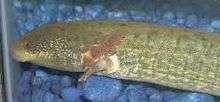Greater siren
| Greater siren | |
|---|---|
 | |
| Scientific classification | |
| Kingdom: | Animalia |
| Phylum: | Chordata |
| Class: | Amphibia |
| Order: | Caudata |
| Family: | Sirenidae |
| Genus: | Siren |
| Species: | S. lacertina |
| Binomial name | |
| Siren lacertina Linnaeus, 1766 | |
The greater siren (Siren lacertina) is an eel-like amphibian. The largest of the sirens and one of the largest amphibians in North America, they measure around 1.5 cm (0.59 in) in length upon hatching and then grow to lengths ranging from 18 to 97 cm (7 to 38 in).[2][3][4] Weight can range from 55 to 1,000 g (1.9 to 35.3 oz).[5][6] They range in color from black to brown, and have lighter gray or yellow underbellies.

Younger sirens also have a light stripe along their sides, which fades with age. They have large gills and no hind legs. The front legs, each with four toes, are so small that they can be hidden in the gills. S. lacertina sirens are generally carnivorous and eat annelids, insects, snails, and small fishes, although they have also been observed to eat vegetation. They use a lateral line sense organ for finding prey.
They live from Washington, D.C., to Florida. Females lay eggs between February and March, as many as 500. The eggs hatch two months later. The method of egg fertilization is currently unknown. They are nocturnal and adults spend the day under debris and rocks or burrowed in mud or thick vegetation. Young are often seen amid water hyacinth roots. Adults are sometimes caught at night by fishermen. When drought strikes, the sirens can aestivate in mud burrows and their bodies secrete a moisture-sealing cocoon over their skin.
.jpg)
.jpg)
References
- ↑ Parra-Olea, Gabriela; Wake, David and Hammerson, Geoffrey (2004). Siren lacertina. In: IUCN 2012. IUCN Red List of Threatened Species. Version 2012.2.
- ↑ Heisler, N.; Forcht, G.; Ultsch, G.R.; Anderson, J.F. (1982). "Acid-base regulation in response to environmental hypercapnia in two aquatic salamanders, Siren lacertina and Amphiuma means". Respiration Physiology. 49 (2): 141–58. doi:10.1016/0034-5687(82)90070-6. PMID 6815749.
- ↑ Greater Siren – North Carolina. Herpsofnc.org (2007-09-22). Retrieved on 2013-01-03.
- ↑ Siren intermedia. AmphibiaWeb (2003-12-04). Retrieved on 2013-01-03.
- ↑ Martin, Karen M.; Hutchison, Victor H. (1979). "Ventilatory Activity in Amphiuma tridactylum and Siren lacertina (Amphibia, Caudata)". Journal of Herpetology. 13 (4): 427–434. doi:10.2307/1563477. JSTOR 156347.
- ↑ Deyle, Anna C. (2011) Population Genetics of Amphiuma means and Siren lacertina in Central Florida. M.S. Thesis, University of South Florida
External links
![]() Data related to Siren lacertina at Wikispecies
Data related to Siren lacertina at Wikispecies
![]() Media related to Siren lacertina at Wikimedia Commons
Media related to Siren lacertina at Wikimedia Commons
Category:Amphibians of the United States
